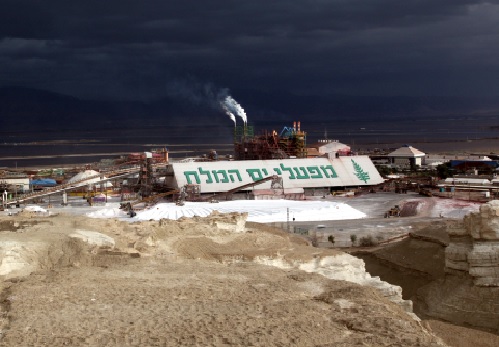You can't move the Dead Sea – but you can drive away businesses. A cautionary tale on Israeli government heavy-handedness and damage to the economy.
Bottom line, company managers need to present shareholders with profits · The State of Israel, meanwhile, thinks it can increase taxes on Israeli Chemicals, Ltd. over and over because "The Dead Sea can't be moved" · It turns out that's wrong: a freefall in company profits has led to the current wave of layoffs and the movement of businesses abroad · When the state squeezes its tax fist, investors run away

The storm surrounding the firing of some 140 of the 800 workers at the bromine compound plant in Ramat Hovav is the most recent chapter in the story of Israeli Chemicals, Ltd. (ICL). The workers claim that management has a secret plan to move ICL activity abroad. For its part, management has revealed cases of union nepotism and bloated salaries at the plant. Both sides are right in this case, but the real story is that of a failed gambit: The government of Israel, backed with broad public support, gambled that natural resource-based manufacturers would have no choice but to take any tax hit they're dealt. They turned out to be wrong.
This story starts in the first years of the state: The Palestine Potash Company, a private firm run by Moshe Novomeysky, successfully operated from the early 1930s onward. Production stopped after the War of Independence, Novomeysky was humiliatingly removed by the state, and the plants were nationalized and re-opened as the Dead Sea Works. The government also founded ICL, which absorbed the Dead Sea Works.
Exploitation of Contract Workers to Protect Veterans
For years, ICL was run as a government monopoly either at a loss or barely getting by, until the government went public with its shares in 1992 and a controlling interest was bought by the Israel Corporation in 1997. At this point, a sort of silent agreement formed: The government agreed not to raise taxes or the dividends it charges, while ICL agreed not to touch the workers' bloated salaries. This arrangement seemed to work for a while – the government received fairly low tax and dividend payments, but still ended up ahead: Tax revenue went up from some $31.5 million in 1996 to $348 million in 2011 (here, some of the taxation went to the pockets of other governments). For its part, the Israel Corporation managed to increase its profits to an even greater extent, and in 2013 it made a net profit of $820 million, as opposed to $69 million in 1996.
The workers also benefitted in this deal. As with other monopolies and cartels in the market – all under government auspices – all kinds of problematic practices became established on the labor side of things: inflated salaries, unnecessary workers, exaggerated working conditions, spendthrift members of the workers' committee, and a staggering amount of nepotism in hiring practices. But in contrast to the other monopolies and cartels – the banks, the Electric Company, the water company (Mekorot), or public sector workers – who could pass on the cost of their inefficiencies, ICL had to compete with other companies in the world and could not raise the cost of phosphates in the world.
To ensure that the plant could continue to profit at the current rate, there was a silent agreement between workers and the management that the veteran workers (those in the first and second generation) could continue to take home their inflated salaries, while workers would be hired alongside them with far worse conditions. The veterans sometimes paid lip service – and sometimes not even that – that their coworkers should work in appropriate conditions, but in practice they understood that that would mean a reduction in their own extravagant terms.
Evidence of the "piggishness" of ICL managers
You Can't Move the Dead Sea?
This balance was destroyed in the second Netanyahu government. Between 2009 and 2013, Treasury Ministry Yuval Steinitz adopted the popular idea that "you can't move the Dead Sea." That is, as opposed to other companies, which could easily and quickly move abroad if taxed too heavily, companies engaged in developing natural resources can't do so that easily, since the sea or land where they derive the resources remain in place. Therefore, Steinitz's logic ran, the government can raise taxes and the company would simply have to oblige.
Then Chairman of the Finance Committee, Moshe Gafni, expressed this approach nicely: "there are situations that are simply inconceivable and unacceptable – how the government gave natural resources, which God gave to the citizens of the state, and gave them at laughable prices.…Today we're slowly fixing this.…The tycoons, or their representatives, met with me, and said: we'll stop looking [for resources]. I said, but that's not true: there will be others who will look. No one stopped. The dividends went sky high…but everyone looks and it's all OK."
Based on this approach, Steinitz arrived at a deal with the ICL which significantly increased the dividends the company pays to the government and required the company to bear the majority of the cost for "the harvest of salt" at the Dead Sea. In the wake of the First Sheshinski Committee, which significantly raised taxation on gas production, the Second Sheshinski Committee was established. This committee disavowed the recent Israel-ICL deal and proposed significantly increasing the taxation on the ICL. The company may have announced that adopting these recommendations would lead to its reducing investment in Israel and expanding abroad, but the government paid no heed. After all, "you can't move the Dead Sea."
Putting the Keys on the Table
At this point, ICL had had it and they put the keys on the table. It may not be possible to "move the Dead Sea", but ICL can. Thus, ICL, which was almost entirely a local plant, started to prepare plans to move in the middle of the previous decade. The plan was no secret. In a 2014 report, the company openly declared that "the global changes in the business atmosphere in which we operate, in parallel to the increasing of the tax burden by the Israeli government, sharpen the need to realize the strategic plan." The key point of this plan, according to the ICL, is expressed by the "investment and purchase of growth engines outside of Israel…[to achieve] efficiency and operational excellence in company plants." In 2014 alone, ICL expanded its activity in mining phosphates in Iberia, entered a strategic partnership in a plant in Ethiopia, increased production and investments in England, entered a plant enterprise in Holland (to which some of the bromide compound plants will be moved), and has also bought part of a phosphates mine in China. The company has also been listed in the United States index, alongside its Israeli listing.
In Israel, meanwhile, the company declared its intention to "focus on reducing costs as a primary element to creating business value in Israel, while executing the efficiency plan in the company plants in the Negev." In other words, the rise in taxes led the ICL to execute a gradual plan to move the production and business elements of the company elsewhere. All this is sharpened in light of the reduced yield to the company, due to the global drop in the price of raw materials. ICL sales in 2014 went down 2.5% and its net profit went down 43%, to $464 million. In the last quarter of 2014, the net profit went down to $85 million, which is only 6% of revenues, as opposed to 13% of revenues in 2013.

Unfeeling Capitalist Pigs
The head of the bromide compound plant workers' committee, Avner Ben Senior, believes that the ICL's move abroad is an act of revenge by Idan Ofer, owner of the controlling interest in ICL. Ben Senior calls Ofer a "hurt man who was deeply offended, left the country to London, and decided to take revenge on the State of Israel." This opinion exists alongside an equally venomous view that ICL is run by a bunch of heartless capitalists who care only about money, like the worker who said his twelve-year-old son was fired while he himself was getting a bypass.
In practice, the ICL is just doing what every company has done throughout history: It tries to create value for its shareholders. When it has difficulty doing it in one place, it goes elsewhere. It really is that simple. Mr. Ofer may indeed have his own personal issues, and there may even be ICL managers who don't really care for the welfare of their workers – but, bottom line, companies and economic systems work according to the profit motive. No profit, no company. It's that simple.
There's also an emotional component, of course. Owners of businesses and companies see the responses. They may not read talkbacks, but they definitely feel the public pressure. Commenters who label a business owner who follows the law as a thief, cheat, and robber and enthusiastically encourage retroactive legislation, seizure of revenues, and nationalization lead directly to populist MKs, from there to a Sheshinski Committee, and finally to legislation. Business owners despise this acrimonious public atmosphere. They quickly translate this feeling into a desire not to do business in such a place and they take their assets and move elsewhere.
So we end up stuck with tax frogs that no-one's willing to swallow. There's a paralyzed gas drill at Leviathan which may never be operated; there's ICL which is getting out of Hebrew Dodge; and there are dozens of companies abroad who know full well that Israel is not a place to do business – even with a heart of gold.
English translation by Avi Woolf.
To receive updates on new articles in English, join Mida on Facebook or Twitter or join our mailing list.




